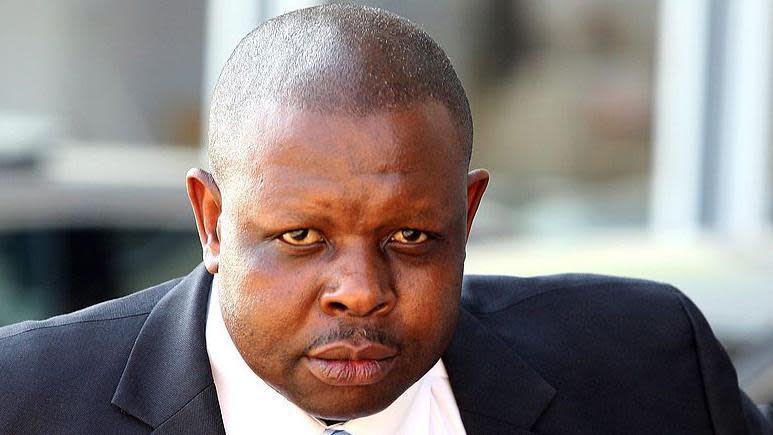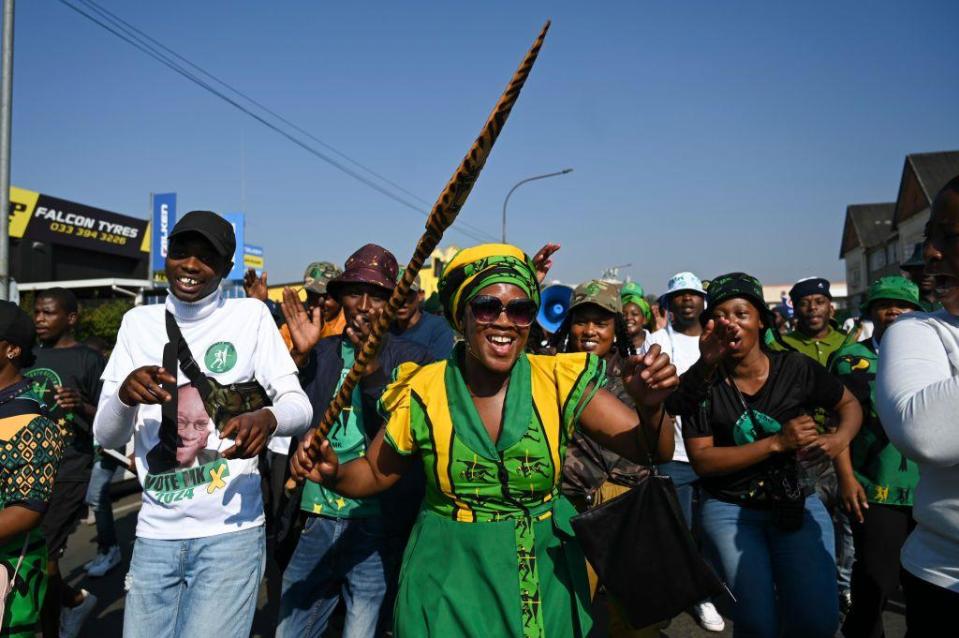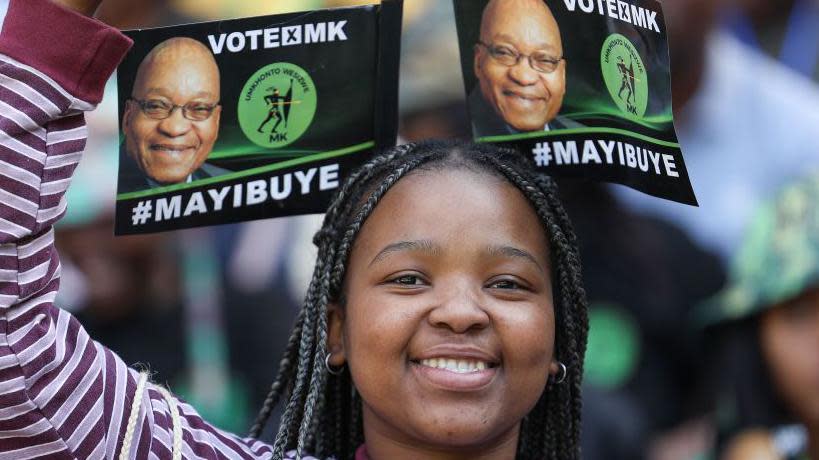Impeached judge itching to take on South African president

- Oops!Something went wrong.Please try again later.
- Oops!Something went wrong.Please try again later.
In a sign of the seismic political changes in South Africa, John Hlophe, a once-celebrated judge whose career ended ignominiously with his impeachment just five months ago, has been parachuted into parliament to lead the official opposition.
Dr Hlophe is expected to be in full flight on Friday, when he will open the debate in response to President Cyril Ramaphosa's speech on Thursday, setting out his new coalition government's plans to tackle South Africa's myriad problems - including an unemployment rate of 32%, high levels of crime, deteriorating infrastructure, and land ownership in a nation bedevilled by racial inequality.
"Watch this space. See him perform on Friday," Dr Hlophe's lawyer Barnabas Xulu told the BBC.
Dr Hlophe's dramatic fall as a judge - and meteoric rise as a politician - can both be traced to former President Jacob Zuma, South Africa's most polarising politician who defied the odds by making his own stunning comeback in the 29 May general election.
Less than three years after he became the first South African president to be jailed for an offence - contempt of court - Mr Zuma led his newly formed party, uMkhonto weSizwe (Spear of the Nation) into third spot in the election.
But as he was barred from taking up his seat in parliament because of the 15-month jail sentence he had received, Mr Zuma turned to Dr Hlophe to take up the all-important post of Leader of the Opposition.
The post comes with an annual salary of just under 1.7m rand ($94,000; £73,000), which Dr Hlophe is likely to appreciate after reportedly losing his judge's pension because of his impeachment for gross misconduct.
MK has become the official opposition because the second-biggest party, the Democratic Alliance (DA), has joined President Ramaphosa's coalition government after his African National Congress (ANC) lost its majority in the election for the first time since the end of the racist system of apartheid in 1994.
Born in 1959, Dr Hlophe, who grew up as a child labourer in a family where his mother was a domestic worker and gardener and his father a security guard and traditional healer, went on to study law locally and abroad, acquiring a PhD from the UK's prestigious University of Cambridge.
As a lawyer in South Africa, he took part in court battles challenging the draconian laws of the apartheid regime, before forging a career as an academic, returning to Cambridge as a Roman law tutor in 1987.
Despite this, Dr Hlophe is a fierce advocate for the "Africanisation" of South Africa's legal system, saying it was "imposed on us" by colonisers, and which "we have mastered, by the way, even better than them" - a comment he made in an address to the African Legal Professionals Association in the coastal city of Durban soon after he joined MK in June.
"African law has never been allowed to develop and take its rightful place," he added.
Dr Hlophe returned to the theme after being sworn in as an MP, saying MK was not "apologetic in our call for the law to be Africanised".
"By that, we mean we bring back the laws that used to govern the African people. One of those laws is this: the land in Africa can never be the subject of private ownership. The land belongs to the nation," he said.

Some critics saw Mr Zuma's decision to appoint him as MK's parliamentary leader as returning a political favour.
His impeachment in February ended a long-running saga that started in 2008 when two judges of South Africa's highest court sent shockwaves through legal and political circles by accusing him of trying to improperly influence them to rule in favour of Mr Zuma in a corruption-related case that the controversial politician was fighting at the time.
Dr Hlophe denied the charges, with Mr Xulu telling the BBC that he simply had a "casual conversation" with the two judges about "legal principles" in what was a "novel" case - something that judges often do among themselves.
Mr Xulu said that Dr Hlophe was still challenging the lawfulness of his impeachment in the courts, though he did not see himself going back to being a judge.
Instead, Dr Hlophe had decided to branch out into politics, joining MK as it was his "ideal" political home, he said.
"He'll continue the fight for justice and transformation in a different platform, the National Assembly, where he will have more freedom, more protection," Mr Xulu added.
Dr Hlophe's impeachment marked a sad end to his judicial career, as he was once among the cream of South Africa's judges, or, as constitutional law expert Narnia Bohler-Muller put it in The Conversation magazine, he was "both brilliant and controversial, on and off the bench".
At the age of 35, in 1995, just a year after the end of apartheid, he made history by becoming the first back judge in South Africa's Western Cape province, and five years later its Judge President.
But his leadership there was turbulent, as he accused some of his colleagues of treating him as a "legal non-entity" and undermining him because he was black. He faced counter-claims of being verbally abusive and even assaulting a judge, which he dismissed as a malicious allegation based on rumour and gossip.
He was also embroiled in numerous other controversies - including allegations that he served as a non-executive director at a financial company, and was paid about $26,000 over three years in consultancy fees.
He denied any wrongdoing, saying he had declared his links with the company to the-then justice minister. The Judicial Services Commission (JSC) dismissed a case against him over the issue, saying there was a lack of evidence.
Now, he has become the first ex-judge to become not only the Leader of the Opposition, but also a member of parliament's justice committee, and, to top it all, MK's representative on the JSC.
Comprising both judges and cross-party MPs, the JSC is the very body that found Dr Hlophe guilty of gross misconduct, leading to parliament impeaching him.
It is also responsible for the appointment of judges, and will choose his successor as Western Cape Judge President.
His long-time adversaries have vowed to challenge his elevation to the JSC in court, with campaign group Freedom Under Law saying it was "irrational" for an impeached judge to be involved in the appointment of other judges.

Significantly, the ANC supported his appointment to the JSC, while two of its coalition partners, the DA and the Afrikaner nationalist Freedom Front Plus, opposed it.
William Gumede, an academic at Wits University's School of Governance in Johannesburg, said the ANC's decision did not come as a surprise.
"There are going to be big battles with MK, but this is not one that the ANC was prepared to fight because it could have set the wrong tone for the opening of parliament," Prof Gumede told the BBC.
Furthermore, the ANC had to take into account the fact that Dr Hlophe remains popular, despite his impeachment, said Prof Gumede.
"Many black voters appear not to mind supporting people implicated in abusing public office, if these people can successfully cast themselves as victims of a conspiracy, supposedly by the 'system'," he added.
He said a lot now depended on how Dr Hlophe performed in parliament.
"If he provides effective opposition, MK could grow and he could potentially be its next leader," Prof Gumede added.
This is a far cry from the 65-year-old's childhood as a labourer for a sugar-cane farmer whom he called "filthy rich" - a man who went on to help finance his university education.
"I grew up poor, like most South Africans," he told a podcast hosted by the Economic Freedom Fighters (EFF), an opposition party with whom MK has formed an alliance in parliament.
"I started weeding sugar-cane fields at the age of 12. I would carry 12kg of fertiliser on my back and I would never look back. We used to work very hard, even Christmas and public holidays. There were just no holidays, considering there were no labour laws then," Dr Hlophe added.
His comments are a poignant reminder of black people's lives under white-minority rule - and the racial and ideological fault-lines that run through a country where black people have only been allowed to vote for 30 years.
More BBC stories about South Africa:
The ex-gangster who has become South Africa's sports minister
The winners and losers in South Africa's historic new government
Cyril Ramaphosa - South African union leader, mine boss, president

Go to BBCAfrica.com for more news from the African continent.
Follow us on Twitter @BBCAfrica, on Facebook at BBC Africa or on Instagram at bbcafrica

